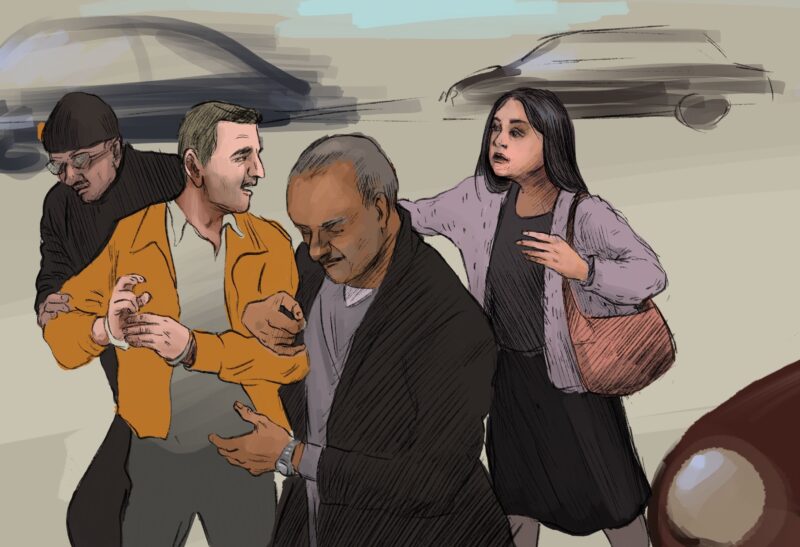In Azerbaijan, you can become a target of hate speech for unpopular statements, your political position, gender identity, or clothing style. LGBT+ individuals, feminists, and social and political activists are particularly likely to become targets of hate.
In only the last few years 2 transgender women were killed because of hateful statements made by bloggers. A few other LGBT+ individuals were attacked but survived. The most recent incident was a murder incited by blogger Sevinj Huseynova, who called for the mass murder of LGBT+ people. A group of activists filed a collective complaint with law enforcement, but it was rejected. Huseynova has stated numerous times that she has never been summoned by the authorities for her incitement.
Some activists believe that the authorities turn a blind eye to hate speech when it is aimed at “undesirables,” but their response is harsh when they themselves are criticized.
In Azerbaijan there is no law on defamation to protect people from slander and insults, and existing legislation cannot regulate what goes on in the virtual world.
But the reaction to criticism of the authorities is never long in coming. Recently, for example, the journalist Anar Abdulla was sentenced to 15 days on charges of “minor hooliganism” and resisting arrest. Many believe that the real reason for his arrest was a critical comment which he wrote about a speech made by President Ilham Aliyev about the war. Before his arrest, Abdulla stated that for criticizing the authorities he had been summoned by the police who beat and abused him.
“They challenged me to a fight”
Civic activist Giyas Ibrahimov says that during the Second Karabakh War he became the target of threats and attacks for his antiwar position. The opinions that he shared on social media upset some people, and as a result he faced pressure, harassment, and even open threats.
“Frankly, in certain situations you could predict and accept that you will get threats. But how could you accept threats and insults for anti-war beliefs? Eventually, what started as threats turned into something more. At that point in my DMs I got numerous threats. I didn’t even read most of them, I just deleted them. Some wrote asking for my phone number and my address. They wanted to “talk” or they challenged me to fights.”
Although Ibrahimov did not turn to the police regarding these threats, there were others who filed complaints against him. He was summoned by the police and spoke with them. The activist points out that law enforcement is obliged to protect any citizen even if they have not filed a complaint:
“If, for example, I write that I’m planning to stab someone, I’m sure that I’ll be summoned by the police even if no one makes an official complaint. During the war a lot of people wrote that about me, but the authorities didn’t react at all.”
“I get a lot more threats”
Feminist and women’s rights activist Narmin Shahmarzadeh says that she also faces harassment and threats for her views.
According to her, the Azerbaijani authorities cannot tolerate feminists because – unlike some other government-controlled organizations which still talk about women’s rights – they are not interested in “cosmetic” changes and do not stretch the facts, but rather try to get at the root of the problem and expose the role of the state.
Shahmarzadeh says that she doesn’t make public most of the threats she receives.
“You could say that I make a lot of things public anyway. But not everything. I get a lot more threats. Sometimes it’s just messages in my DMs. I never post those. Or, for instance, if I’m summoned by the police five times – to a station or headquarters – I don’t post about every single summons. Just like I don’t post about every attempt to hack my account.”
The gender activist believes that the Azerbaijani authorities do not view people or approaches as problems if they pose no threats to the authorities themselves, and therefore they do not take any measures against them.
Since the feminists’ fight and demands are aimed directly at the government, the government takes measures against them, says the activist.
Troll farms and fake correspondence
Civic activist Bakhtiyar Hajiyev says that he faces the greatest pressure for his critical statements from the authorities themselves.
According to him, members of pro-government troll farms or individual state employees, egged on by their bosses, put pressure on him and on other people who post critical comments.
“But I was a special case. The authorities cooked up fake intimate correspondence and published it, provoking a short-lived public discussion. The goal of this scheme was, naturally, to create in the public’s mind a negative image of people who criticize the authorities, to compromise them and thereby influence public opinion.”
The European Court of Human Rights has repeatedly ruled that the Azerbaijani authorities unjustly arrest activists who criticize them as retribution.
The international organization Human Rights Watch writes that the Azerbaijani authorities continue to ruthlessly repress those who speak out against them.
“The space for independent activism, critical journalism, and opposition political activity has been virtually extinguished as so many activists, human rights defenders, and journalists have been arrested and jailed, and laws and regulations restricting the activities of independent groups and their ability to secure funding adopted,” states the organization’s website.
The Azerbaijani authorities, in their turn, label such reports by international organizations biased and subjective, claiming that they do not persecute anyone for differences in political views.
Ilham Aliyev on slander against him
Hajiyev recalls how, many years ago in an interview with the TV channel ANS, President Ilham Aliyev complained bitterly of being slandered.
In that interview, Ilham Aliyev said that some political forces were waging a campaign of slander against him and spreading rumors that he was a gambler in order to cast aspersions on him and his father, former president Heydan Aliyev, and compromise them.
According to Hajiyev, if the team of a person who once complained of slander is now involved in slandering others, they ought to think hard about what they are doing.
The activist asserts that he has written about a hundred appeals to law enforcement agencies regarding threats and pressure against him, but they respond that they cannot find the people involved because they are located abroad or – because the law will not allow it.
“But these are just excuses. Otherwise law enforcement agencies would put forward an initiative asking the Presidential Administration to propose that parliament introduce the relevant amendments to the legislation. In the last 10-15 years, I have repeatedly witnessed parliament pass amendments advantageous to the authorities in record time. So this kind of statement from the law enforcement agencies is just an excuse.”
“They arrest people for their critical statements”
According to human rights defender Anar Mammadli, Azerbaijan has confused hate speech with criticism.
“Hate speech, as a rule, contains incitement to commit some illegal acts, such as violence or “expelling” an individual or a group of people from society based exclusively on their national, ethnic, religious, or gender identity or their political views. Critical statements are something entirely different. They are a different point of view, a different evaluation of or approach to certain events or people related to these events.”
Mammadli says that the government must make it clear that, according to the constitution, everyone is equal before the law and everyone will be held responsible if they make statements inciting murder, beatings, or violence towards anyone. Measures must be taken against them. The fact that the government does not do that, according to Mammadli, is due to the fact that it is against their interests to allow the country to democratize or to allow the growth of a culture of democracy.
“For many years, people in Azerbaijan have been arrested and detained for their political views and not even for hate speech, but for critical statements. They are subjected to administrative arrest for 10, 15, or 30 days or sentenced to several years on trumped up criminal charges. All these people face such discrimination because they made critical statements about the authorities, the government, senior officials, or not-so-senior officials. In and of itself, this phenomenon – right now I’m not talking about hate speech – demonstrates the intolerance of the Azerbaijani authorities. And intolerance of criticism automatically puts freedom of speech in society in doubt.”
The human rights defender points out that the authorities are obliged to defend the freedom of speech of all citizens while maintaining a balance.
“Those who defend the rights of sexual minorities or political prisoners, or those who demand free elections, have the right to freedom of speech, just as those do who hold the opposite views,” he explains.
According to article 25 of the Constitution of the Republic of Azerbaijan, the state must protect the rights and freedoms of all citizens without exception, regardless of their race or ethnicity, religion, language, gender, origins, property status, occupational status, convictions, or membership in a political party, labor union, or other associations. A person and citizen’s rights cannot be limited based on race, ethnicity, language, religion, gender, origins, views, or political or social stance.
Produced with the support of the Russian Language News Exchange.



